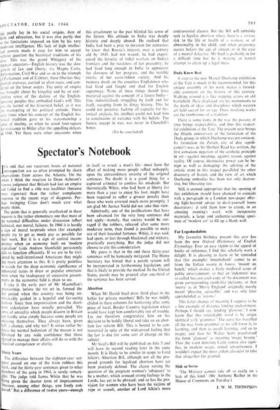Spectator's Notebook
TVs odd that our recurrent bouts of national !introspection are so often prompted by sharp observations from across the Atlantic. On the whole I think the reaction to Dean Acheson's famous judgment that Britain had lost an empire and failed to find a role was healthier (because more vigorous) than the rather complacent response to the recent orgy of diagnosis. Per- haps Swinging Cities don't much care what people think.
The point that is generally overlooked in these inquests is the rather elementary one that most of the national difficulties under discussion reflect technical, not moral, failures. In 1966 it is hardly a sign of moral turpitude when (for example) People try to get as much pay as possible for their work. But it is a sign of central incom- petence when an economy built on 'modern capitalism' (vide Andrew Shonfield) persistently fails to function efficiently. If we are to be vivi- sected by well-intentioned Americans they might pay more attention to this. It is pretty pointless to search for the deep economic significance of ephemeral tastes in dress or popular entertain- ment when the inadequacy of successive govern- ments in the economic field is plain to see.
I take it the early part of Mr Macmillan's premiership, before the rot set in, formed the last period when this country was being un- mistakably guided in a hopeful and far-seeing fashion. Since then imprOvisation and the short- term calculation have usually prevailed. The sense of unreality which people discern in Britain can hardly arise simply because some people are enjoying themselves. They always have, given half a chance, and why not? It arises rather be- Cause the normal hedonism of the masses is not galanced by any wide confidence that those elected to manage their affairs will do so with the required competence or clarity.














































 Previous page
Previous page